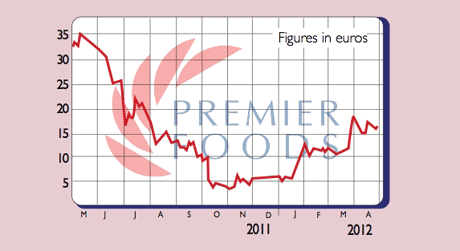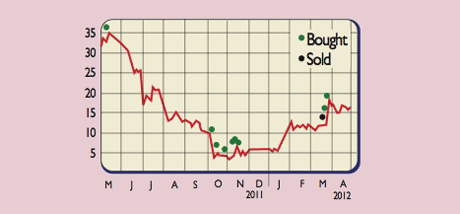Should you take a bite of Premier Foods?
Sales are growing at Premier Foods. But has the maker of Hovis and Bisto taken on too much debt? Phil Oakley investigates.
Get the latest financial news, insights and expert analysis from our award-winning MoneyWeek team, to help you understand what really matters when it comes to your finances.
You are now subscribed
Your newsletter sign-up was successful
Want to add more newsletters?

Twice daily
MoneyWeek
Get the latest financial news, insights and expert analysis from our award-winning MoneyWeek team, to help you understand what really matters when it comes to your finances.

Four times a week
Look After My Bills
Sign up to our free money-saving newsletter, filled with the latest news and expert advice to help you find the best tips and deals for managing your bills. Start saving today!
Sales are growing at the branded foods maker, but the good news is priced in, says Phil Oakley.
The business
Premier Foods is Britain's largest branded food producer. Its key brands include Hovis Bread, Ambrosia desserts, Bisto gravy, Loyd Grossman sauces, Mr Kipling cakes, Batchelors soups and Sharwoods Asian sauces. The company operates from more than 40 sites and sells its products to retailers, wholesalers and food service companies. Around 70% of its sales come from branded products, with the rest coming from selling own-label products to major retailers.
The history
The company's history can be traced back to 1981 when Hillsdown Holdings bought Lockwoods Foods from the receivers. It spent most of the 1980s building up a large canned food business; 1990 saw the purchase of Premier Brands, which included household names such as Typhoo, Smash and Cadbury's drinks.
MoneyWeek
Subscribe to MoneyWeek today and get your first six magazine issues absolutely FREE

Sign up to Money Morning
Don't miss the latest investment and personal finances news, market analysis, plus money-saving tips with our free twice-daily newsletter
Don't miss the latest investment and personal finances news, market analysis, plus money-saving tips with our free twice-daily newsletter
But it wasn't until the 2000s that the company's brand portfolio really took off. In 2002, it bought Nestl's UK food business for £115m, giving it brands such as Branston and Crosse & Blackwell. In 2005 it bought Marlow Foods and the fast-growing Quorn brand.
Bigger deals soon followed. In 2006, Premier splashed out £460m on Campbell's British and Irish business (Oxo, Batchelors and Homepride), but this was dwarfed by the £1.2bn purchase of Rank Hovis McDougall in 2007. The Rank Hovis McDougall deal gave Premier some of Britain's best-known food brands, such as Hovis, Sharwoods, Cadbury's Cakes and Bisto.
But it also saddled the company with lots of debt. Premier failed to capitalise on its strong brands and struggled to cope with rising energy and ingredients costs and the buying power of large supermarkets.
Falling profits meant that the company found it increasingly hard to pay the interest on its huge debts. In 2011 a new management team was brought in to turn the company around.
The chief executive
Michael Clarke is the man charged with restoring the fortunes of Premier Foods. He has been chief executive since September 2011 and looks to have the ideal background to run the company. He was previously head of Kraft Food's European business, having also worked at Coca-Cola and Reebok.
During his time at Kraft, Michael Clarke played a major role in the company's purchase of Cadbury and the controversial decision to close a British factory it had previously promised to keep open. That said, he was very successful at focusing Kraft's brand portfolio and growing sales. Investors in Premier Foods will hope that he can do the same for them.
Should you buy the shares?
Premier Foods looks like a very risky investment. Don't be fooled by the low price/earnings (p/e) ratio, as the shares are lowly rated for good reasons. If a weak economy and powerful customers aren't big enough challenges, Premier Foods has nearly £1bn of debt and a sizeable pension fund shortfall of nearly £300m. Should sales and profits continue to decline, then you might be left with little to show for your money.
If, on the other hand, Premier Food's growth strategy begins to bear fruit, then the rewards could be big. The company is pinning its hopes on eight key brands and is doubling the amount of money it spends on them in 2012. It is also looking to fix its relationships with its big supermarket customers. Weaker brands will be sold to pay down debt. Clarke was successful with a similar strategy at Kraft, where a focus on its top 15 brands saw healthy sales growth.
Although it is still early days, a recent trading update shows that Premier Foods' sales have begun to grow again. However, the shares have soared from their November 2011 low of 3p which means that, at current levels, a lot of good news is already priced in. It looks to us like this is one to avoid.
The numbers

Stockmarket code: PFD
Share price: 16p
Market cap: £383.7m
Net Assets (Dec 2011): £572.7m
Net debt (Dec 2011): £995.1m
P/e (current year estimate): 4.9
Yield (prospective): N/a
What the analysts say
Buy: 1
Hold: 5
Sell: 6
Average price target: 12p
Directors' shareholdings

M Clarke: 3,740,785
M Moran: 17,540,000
R Bell: 854,700
Get the latest financial news, insights and expert analysis from our award-winning MoneyWeek team, to help you understand what really matters when it comes to your finances.
Phil spent 13 years as an investment analyst for both stockbroking and fund management companies.
-
 Should you buy an active ETF?
Should you buy an active ETF?ETFs are often mischaracterised as passive products, but they can be a convenient way to add active management to your portfolio
-
 Power up your pension before 5 April – easy ways to save before the tax year end
Power up your pension before 5 April – easy ways to save before the tax year endWith the end of the tax year looming, pension savers currently have a window to review and maximise what’s going into their retirement funds – we look at how